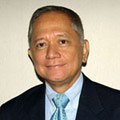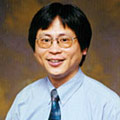English Language as a Lingua Franca
Featured Colloquia > English Language as a Lingua Franca
Prof Andy Kirkpatrick
Hong Kong Institute of Education
China
Andy Kirkpatrick is Head of the Department of English at the Hong Kong Institute of Education. His research interests include the development of new varieties of English, Chinese rhetoric, and the development of academic disciplines in China. He is currently working on the linguistic features of English as a lingua franca in ASEAN. His recent publications include World Englishes: Implications for International Communication and English Language Teaching (CUP, 2007); English in Southeast Asia: Literacies, Literatures and Varieties (co-editor, Cambridge Scholars Press, 2007) and Linguistic imperialism: English as a global language, in Pauwels, A. and Hellinger, M. (Eds.) Handbook of Applied Linguistics, Volume IX, Language Diversity and Change. (Berlin: Mouton de Gruyter, 2007).

Prof Jennifer Jenkins
University of SouthamptonUK
Jennifer Jenkins is Professor of English Language in the Department of Modern Languages at the University of Southampton. Her principal research interest for almost twenty years has been World Englishes in general, and English as a Lingua Franca/International Language in particular. She is the author of numerous journal articles on these subjects as well as three books: The Phonology of English as an International Language (OUP, 2000), World Englishes (Routledge, 2003), and English as a Lingua Franca: Attitude and Identity (OUP, 2007).

Dr Edilberto C de Jesus
Former Secretariat DirectorSoutheast Asia Ministers of Education Organization (SEAMEO)
Edilberto C de Jesus stepped down as Secretariat Director of the Southeast Asian Ministers of Education Organisation (SEAMEO) in January 2008. He had been responsible for coordinating activities among SEAMEO member countries, SEAMEO Centres, donors and other organisations, to convene meetings and conferences, focus on policy matters and organise special projects. Dr Edilberto C de Jesus attended Ateneo de Manila University where he achieved a BA honours course in Humanities before completing M. Phil and Ph. D. degrees in History at Yale University. After his studies he joined the faculty of the Asian Institute of Management. He served in the Cabinet of President Corazon Aquino from 1987 to1992 as Presidential Adviser on Rural Development and Deputy Peace Commissioner. He returned to AIM to put up the Policy Center, leaving In 1995 to serve as the president of Far Eastern University in Manila. From 2002-2004, he served as Secretary or Minister of Education in the first term of President Gloria Macapagal Arroyo.

Dr David C S Li
City University of Hong KongChina
David C S Li is an associate professor at the Department of English and Communication, City University of Hong Kong. He obtained his BA (English) in Hong Kong, MA (Linguistics and Applied Linguistics) in Besaçon, France, and PhD (Linguistics) in Cologne, Germany. He has published widely in three main areas: Hong Kong English vis-à-vis World Englishes, Cantonese-English code-switching, and Hong Kong Chinese learners’ EFL learning difficulties and correction strategies. He is currently working on two government-funded research projects: one compares the motivations of Chinese-English code-switching in Hong Kong and Taiwan; the other investigates Chinese Hongkongers’ perception of ‘Hong Kong English’ and their preferred norms and models of English.

Prof Barbara Seidlhofer
University of ViennaAustria
Barbara Seidlhofer is Professor of English and Applied Linguistics at the University of Vienna. Her teaching and research focus on corpus linguistics, sociolinguistics, discourse analysis and pragmatics, in particular in their application to language teacher education. Her publications include the books Pronunciation (with C. Dalton), Oxford University Press 1994, Approaches to Summarization: Discourse Analysis and Language Education, Gunter Narr 1995, Principle and Practice in Applied Linguistics (with G. Cook) Oxford University Press 1995; Language Policy and Language Education in Emerging Nations (with R. de Beaugrande and M. Grosman), Ablex 1998 and Controversies in Applied Linguistics, Oxford University Press 2003. She is also editor of the International Journal of Applied Linguistics (Blackwell) and the founding director of the Vienna-Oxford International Corpus of English (VOICE), which aims to provide a basis for the linguistic description of English as a Lingua Franca.
Abstracts
English Language as a Lingua Franca: Implications for EMI Universities
In this colloquium speakers will consider the implications of the emergence of English as a lingua franca (ELF) for English-medium universities. The colloquium will be introduced and moderated by Prof Andy Kirkpatrick.
ELF or ENL for English Medium Universities?
by Prof Jennifer Jenkins
It is a largely unquestioned assumption of the global academic community that the appropriate English for academic purposes, and that which should therefore be used in EMI universities, is an ENL (English as a Native Language) variety (primarily British or American). In her paper she will explain why she believes an academic ENL approach is neither valid nor useful for anyone other than the relatively small number of mother-tongue ENL speakers themselves. She will argue that an ELF approach is a more appropriate way forward, and that one of the most important first steps towards implementing such an approach will be a change in attitude towards non-mother tongue varieties of English and academic ELF.
What to do with ‘3rd person singular’?
by
Dr David CS Li
The '3rd person singular' present tense verb form is one of the most notorious ‘errors’ in the English output of EFL speakers, advanced learners included. It tops the list of five lexico-grammatical ‘sins’ in the VOICE corpus which have been shown to have minimal impact on ELF communication (Jenkins, Modiano and Seidlhofer, 2001, p. 16), in that ELF speakers tend to use “the same verb form for all present tense verbs, as in ‘you look very sad’ and ‘he look very sad” (Jenkins, 2003, p. 131; emphasis added). Over two decades ago, a very similar observation was made in Platt, Weber and Ho’s (1984) study of grammatical features across different varieties of New Englishes, where the marking of '3rd person singular' was found to be limited, as in ‘She drink milk” (The Philippines) and ‘Every microcosm consist of many cells’ (India; cited in Jenkins 2003, p. 26). This paper discusses one illogicality in Standard English varieties, namely, the use of the same suffix ‘-s’ (and its allomorphs) to mark two diametrically opposed grammatical meanings or redundancies: on one hand, ‘-s’ is used to signify ‘more than one’ in plural nouns. On the other hand, the same suffix ‘-s’ is required for signaling the complex meaning ‘one and only one, 3rd person’. This is conceivably a main source of confusion as well as a primary reason for EFL learners’ learning difficulties and relative underachievement, especially for people whose L1 morphology does not make a clear distinction between different word classes, as in Chinese.
The English Patient
by
Dr Edilberto de Jesus
Dr Edilberto de Jesus, until recently Director of the South East Asian Ministers of Education Organisation based in Bangkok and whose career postings have included being President of Far Eastern University and Minster of Education in Gloria Arroyo’s first cabinet, will reflect on the role of English in universities of the region and consider future prospects.
ELF and the 'E' in 'EMI'
by Prof Barbara Seidlhofer
An effective and adaptable approach to education, in EMI universities as well as elsewhere, depends on an understanding of how language varies to meet different communicative conditions and purposes - particularly in the age of globalization and 'Englishization'. Such an understanding can be furthered by investigating how the 'E' in 'EMI' actually works and what a realistic model of successful use of English in the global academic community looks like. The presentation will give an introduction to a resource for addressing these questions that will soon become available: the Vienna-Oxford International Corpus of English (VOICE). This corpus will make it possible to describe characteristics of how English is used as a lingua franca in a range of settings and speech event types and by speakers from different first-language backgrounds. It will be argued that once descriptions of successful ELF use in various professional domains become available, this will have a positive effect on the (self-)perception of ELF speakers as language users in their own right rather than perpetual 'learners' falling short of inappropriate ENL targets.
